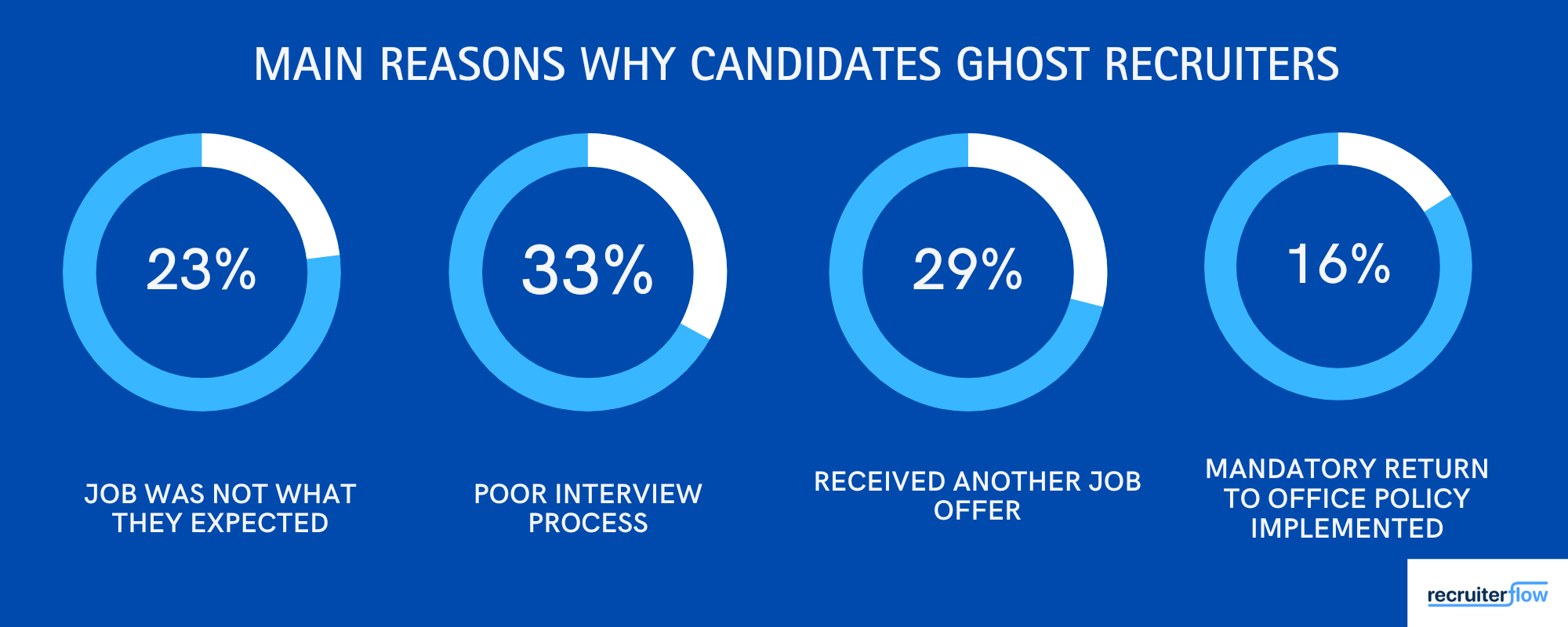
What is Candidate Ghosting and What Recruiters Can Do in 2025?
Ghosting is not just a dating trend anymore. Job seekers are doing it too. Whether they’ve found another job, lost interest in the position, or just don’t have the guts to say “no,” candidates are disappearing without any explanation.
According to a 2021 report by Indeed, 28% of job applicants had ghosted a prospective recruiter over the past year. The numbers only get worse on the recruiter side, with 76% reporting they’ve been ghosted in the past year. In fact, 57% say it’s now more common than ever before.
Let’s deep-dive into what is candidate ghosting, how to avoid it, and what you can do if you ever get ghosted by a candidate.
What is candidate ghosting?
Before going into the literal definition of what is candidate ghosting, picture this – you’ve finally found the ideal candidate for your client’s job opening. You spent hours screening resumes and conducting an extensive 1:1 interview. With all green signals, you scheduled a client-candidate interview.
However, at the time of the interview, the candidate didn’t show up. You tried following up with calls, messages, and emails, but all your attempts went unanswered. It was as if your perfect candidate had vanished into thin air. This exactly is what we call candidate ghosting.
In essence, candidate ghosting refers to a scenario where a job candidate suddenly ceases communication with the recruiter during the hiring process. This can happen at any point, from submitting an application to receiving a job offer.
Why Do Candidates Ghost Recruiters?

There are several reasons why candidates may ghost recruiters. Some candidates may have found another job or lost interest in the position. Others may be too nervous or afraid to say “no” to the recruiter, so they simply stop responding. Additionally, candidates may be dissatisfied with the way the recruitment process is being handled, such as lack of communication or poor candidate experience. Below are a few common reasons for candidate ghosting –
1. Lack of Excitement About the Role
If a candidate isn’t enthusiastic about your company or the position they’ve applied for, they may choose to ghost instead of formally withdrawing from the recruitment process. This is especially likely if they haven’t received any communication from the recruiter. Communication is the best way for candidates to build positive affinity with recruiters.
2. Confusion About the Role
When job candidates are applying for multiple similar roles, a lack of clarity around responsibilities, job scope, and more can cause them to ghost. For example, if they’re applying for an admin or office job, make it clear if they will be shredding documents and doing data entry. A clear, well-written job posting will tell candidates if they should interview with your organization.
3. Unaligned Compensation or Benefit Expectations
If salary and benefits expectations are not aligned, candidates may ghost later in the hiring process. This can be avoided with a clear conversation about compensation early in the recruitment process. Allowing applicants to remove themselves from the hiring process if compensation isn’t aligned will decrease the chances of them ghosting later on in the process.
4. Change in Personal Circumstances
At times, a candidate will have changes in their personal circumstances. For example, a new spouse, new child, or family emergency may cause them to withdraw from your hiring process without explanation. This can lead to ghosting, especially if the personal change causes the candidate to stop their job search entirely.
5. Change in Professional Circumstances
In today’s market, a change in professional circumstances can lead a candidate to ghost a hiring manager. Everything from a new role to an internal promotion, raise, or reorganization can push a candidate to disappear from your radar.
Also Read: Candidates’ Top Expectations From Recruiters
How to Avoid Candidate Ghosting?
1. Optimize the application process
Only include relevant and essential questions in your job application. Lengthy and time-consuming forms can deter candidates from completing the application process.
2. Stagger Information Collection
Gather information in different stages of the interview process. For example, request past employer references and recommendation letters closer to the final review stage rather than asking for everything upfront.
3. Automate Interview Scheduling
Leverage recruitment automation to automate interview scheduling. This reduces back-and-forth communication and allows candidates to self-schedule interviews conveniently.
4. Minimize Interview Lag Time
Avoid prolonged delays between interview rounds. If the hiring manager is unavailable, consider involving another team member or establish a regular process where all rounds are conducted on specific days.
5. Maintain Ongoing Communication
Keep candidates engaged throughout the process to prevent ghosting. Send confirmation emails before interviews, proactively communicate about gaps between interview rounds, and regularly check in with candidates via automated workflows.
Recruiterflow’s Recipe feature allows you to take certain actions based on triggers that happen inside the system. For instance, you want to send an automated qualification email to all the selected candidates. You can simply create a dedicated workflow (called recipes) and the Recruiterflow CRM will take care of the automated communication.
Also, check the benefits of CRM for recruitment.
6. Prioritize Candidate Experience
According to a LinkedIn study, 64% of candidates claim great candidate experience prompts them to maintain a relationship with the recruiter even if they didn’t end up getting the job. So, aim to deliver positive candidate experiences that leave a lasting impression. Be transparent and honest, answer interview-related queries proactively, and provide insights into the role, team, and company culture to excite candidates about joining your organization.
Also, read our blog on the candidate experience survey.
7. Treat Candidates Like Customers
Invest time in understanding candidates‘ career goals and establishing meaningful connections. Personalize communications and show genuine care and interest in their journey. Conduct different types of surveys to gather feedback and improve your hiring process.
Also, check What is Time to Fill and How to Reduce It?
8. Initiate Pre-boarding
Start the pre-boarding process as soon as the offer is extended to candidates. Introduce them to their teams, invite them to company events, and make them feel like valued members of the organization.
9. Utilize Engagement Platforms
When a candidate drops off, reopening the job and restarting sourcing is a priority, but it’s also a valuable opportunity for introspection. Evaluate drop-off rates compared to similar roles to assess if adjustments are needed in the job description, pay package, benefits, or perks. Conduct surveys to understand the reasons behind no-shows and cancellations, identifying areas for improvement in the hiring process. Investigate the circumstances of drop-offs to address any negative experiences with recruiters, hiring managers, or dissatisfaction with the offer. Use this feedback to refine your approach and create a more effective and candidate-centric interview process.
10. Create a brand image
“Recruiters get ghosted by candidates every day. It is a standard practice and there is one main contributing factor. TRUST!. People who do not recognize you or the brand you work for are less likely to reply. Less likely to even acknowledge the message and let you know that they aren’t interested in what you have to offer.” – Sean Andreson, Co-founder and CEO Hoxo Media
Invest in your brand identity and perception and be at the forefront of changing the current landscape of candidate ghosting. By cultivating recognition and trust, you can foster stronger connections and more fruitful interactions with candidates. Embracing this new approach will enable you to create a world where trust is the norm, leading to a more efficient and successful recruitment process for everyone involved.
What to Do When a Candidate Ghosts You?
1. Follow up and use different communication channels, if necessary
If a candidate hasn’t responded, it’s fine to check in with them. Sending a follow up email is a great way to see where they are in the process and if there’s anything else you can do to assist them. Just check in to see where they are in the process and if there’s anything else you can do for them, or if there’s anything else they need from you.
If you haven’t heard back from the candidate within 24 hours of sending them an email or text message asking about their progress with the application (or even after following up with another email or text), try reaching out via phone or even via LinkedIn message or Twitter DM. Sometimes candidates may have missed emails due to spam filters or other technical issues, so this could be helpful in making sure your message gets through.
2. Be patient
If you’ve been ghosted by a job candidate, you may be tempted to immediately rescind their offer, but that’s not always the best move.
First of all, you don’t want to let them know that you’re upset or bothered by their silence. Second of all, it’s possible they’re just busy and haven’t had time to respond yet.
So hold off on any decisions until a few days have passed and then reach out again. If they still don’t respond, then go ahead and revoke the offer.
3. Keep records
When a job candidate ghosts you, it’s important to keep records of your interactions with them. You can do this by keeping a copy of every email they sent you, as well as any notes you may have taken during your interviews.
This is especially important if you are considering hiring this candidate in the future. If they ghosted you once, they may do it again—and if that happens, having these records will help you make an informed decision about whether or not to hire them.
4. Evaluate your recruitment process
If you’re finding that candidates are dropping out of the hiring process for no apparent reason, it could be time to look at your recruitment process.
Regardless of why you’re having trouble getting in touch with candidates after they’ve expressed interest, it’s important that you take some time to evaluate what’s going on and make sure you’re doing everything possible to close this deal.
Avoiding ghosting is all about being prepared ahead of time.
Here are a few things you can do –
- Craft better and more compelling job postings
- Gather past candidate testimonials
- Let job seekers know about the next steps
- Schedule interviews promptly
5. Offer incentives
Another way to avoid candidate ghosting is by offering incentives for candidates who complete the recruitment process. This can include signing bonuses, referral bonuses, or other perks that will encourage candidates to keep going through the hiring process until they find the job that’s really right for them.
Conclusion
While improving your hiring process can make it more robust and enhance the candidate experience, it’s important to acknowledge that ghosting is not always within your control. There may be instances where candidates fail to respond or show up for interviews, even if you have optimized your recruiting process. Sometimes, employees who accept offers may ghost by not reporting to work. Recognizing that these individuals may simply lack dependability is essential, and you should commend yourself for avoiding unreliable candidates.



Sagrika Jain